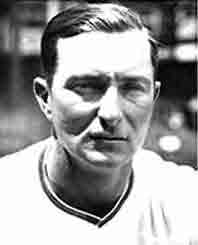
BEER DRINKERS AND HELL RAISERS

Always a threat to break up a ball game but never a party, Waner had the sharpest bloodshot eyes in baseball. He hit
doubles and triples during games and drank them after. It's amazing that he was able to amasse the 3,152 hits with all the partying he did.
One year he announced he was on the wagon, but when his batting average hovered around .250, his manager personally shepherded him to his nearest watering hole. Within a few weeks, he was back over .300. His father wanted him to be a teacher, but he dropped out of college to join San Francisco of the Pacific Coast League, where he compiled batting averages of .369, .356, and .401. In 1926 the Pirates purchased his contract, Paul batting .336 and a league leading 22 triples. The next year, he was joined by his brother Lloyd in the Pirate outfield where they paced Pittsburgh to the 1927 pennant.
Paul received his nickname one day from a frustrated Brooklyn fan who complained: "Them Waners! It's always the little poison on thoid and the big poison on foist!" From then on Paul and Lloyd were Big Poison and Little Poison. Both were speedy outfielders, and Paul possessed perhaps the strongest arm seen in a Pittsburgh outfield until Roberto Clemente arrived.
Paul was not a typical ballplayer of the time. He wrote a comedy skit once that he also appeared in with Heinie Manush and read Seneca in his spare time. He was an avid golfer, becoming so good that he shot in the 70's. He also helped to organized the first National Baseball Players Golf Tournament. He also enjoyed hunting and fishing when he wasn't out partying. One day one of his teammates on the Pirates, Fred Lindstrom, stopped over for a morning golf date. He was told by Waner's wife that he had gone out for a loaf of bread. After waiting for a while, he inquired, "When did he leave for the store?" "Last night". replied Mrs. Waner.
Waner very rarely smiled in his on-field photos! Casey
Stengel once said, "Paul don't smile cause he's too damn tired to smile from being up
all night".
After his retirement Waner found steady employment as a hitting
coach , but his distaste for discipline made him an inappropriate candidate
for managing. Elected to the Hall Of Fame in 1952, he
died August 29, 1965.